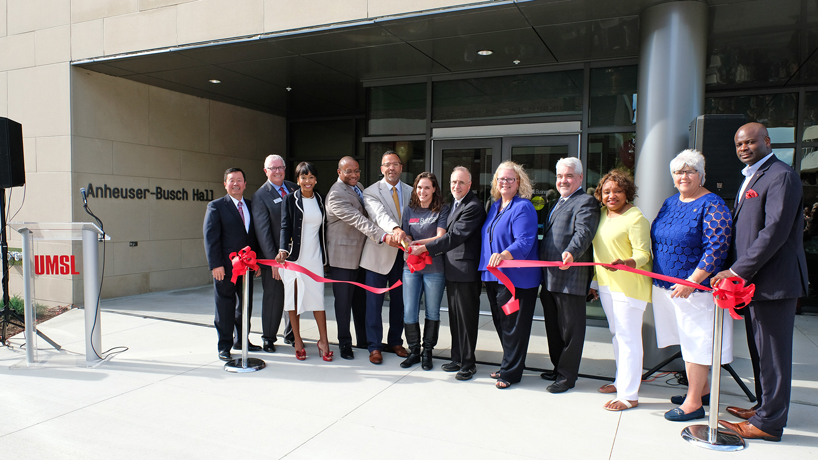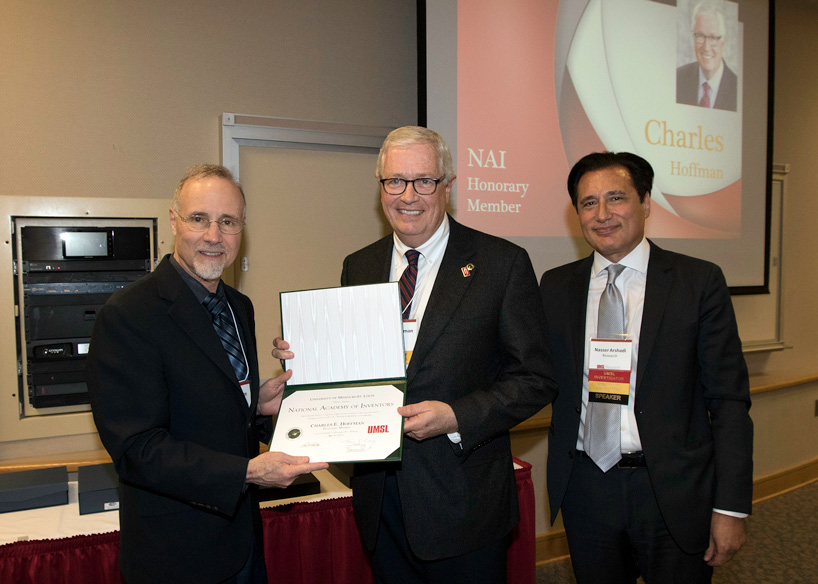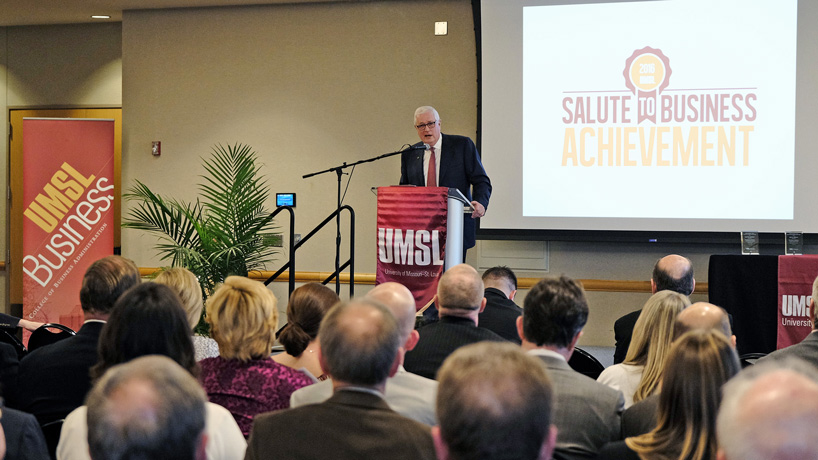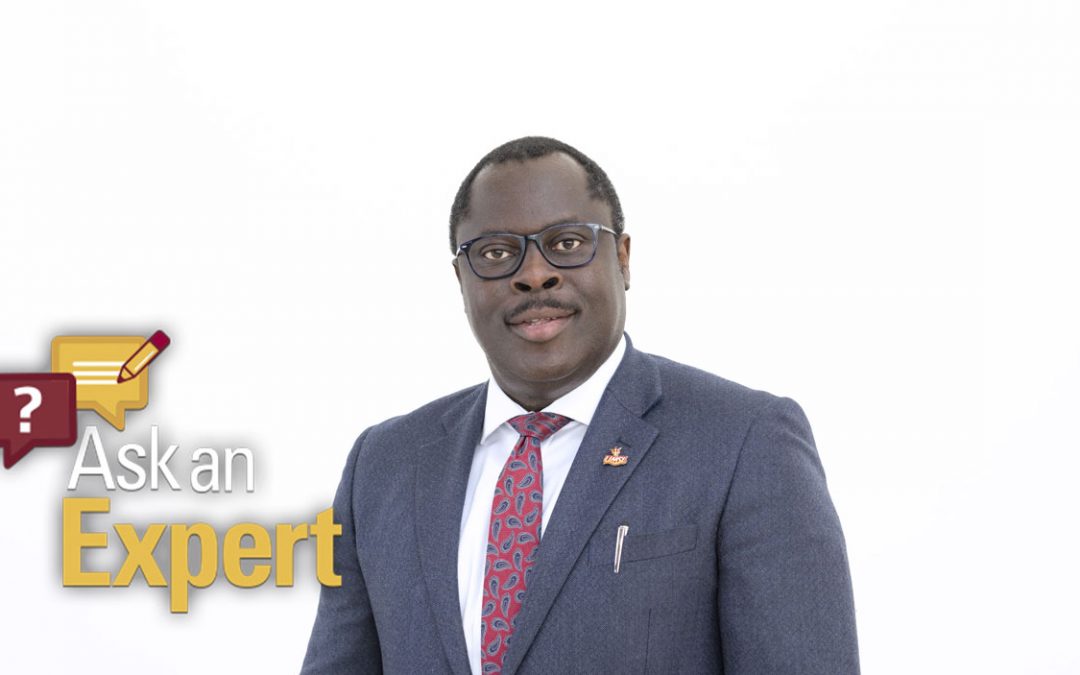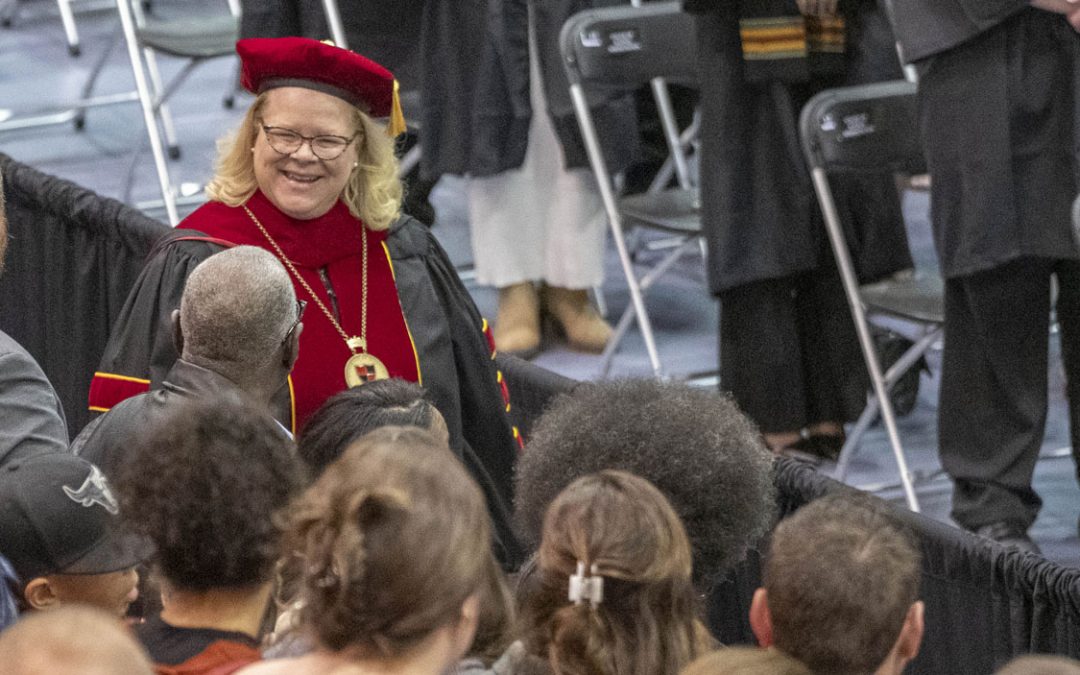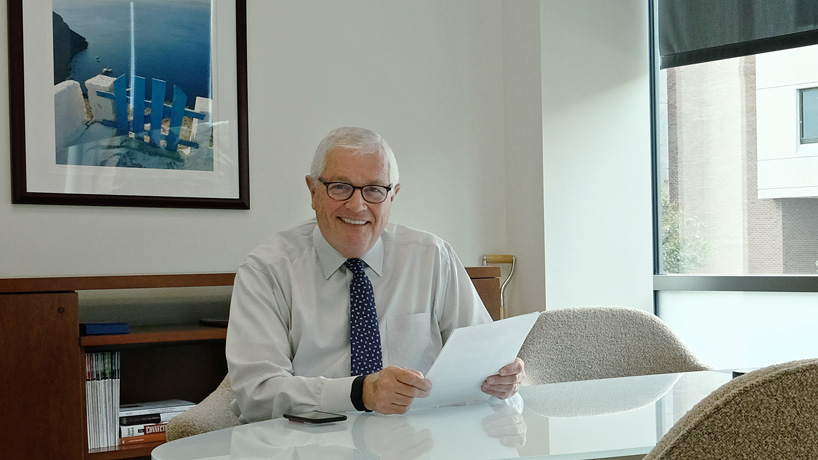
Charles E. Hoffman is retiring as dean of UMSL’s College of Business Administration after nearly seven years in the leadership role at his alma mater. (Photos by August Jennewein)
Charles E. Hoffman already had been retired – twice – when he signed on to serve as dean of the University of Missouri–St. Louis’ College of Business Administration in 2013.
He joked that he made the decision out of boredom.
“You can only play so much golf and go to so many dinners,” said Hoffman, who enjoyed a pioneering career in telecommunications, serving as CEO of Mexico’s national wireless carrier, Telcel, and Canada’s wireless carrier, Rogers Cantel, as well as start-up national broadband carrier Covad Communications.
His affinity for his alma mater – where he earned bachelor’s and master’s degrees in business administration in 1974 and 1976, respectively – actually proved the biggest lure for Hoffman to accept the job as dean.
He certainly has not coasted in that role. Rather, he set about positioning the college to meet the future needs of its students, including helping to conceive and launch UMSL Accelerate to teach entrepreneurship, create the Doctor of Business Administration program to enhance the skills of C-level executives and drive the development of its cybersecurity program – designated as a center of excellence in cyber education by the National Security Agency and Department of Homeland Security.
Dean Charles Hoffman (second from left) took part in the ceremonial ribbon-cutting to mark the opening of Anheuser-Busch Hall in 2017.
The most tangible evidence of his impact is Anheuser-Busch Hall, situated at the north end of UMSL’s Quad. He shepherded the planning and construction of the college’s home, which opened in 2017 and was built entirely using donor, alumni and state funds without tapping into campus or student resources.
Hoffman donated $1 million to the project, and it will remain a central piece of his legacy as he gets set to retire once more, stepping away from his post on June 30.
“We have been blessed to have Dean Hoffman’s leadership over the past seven years,” Chancellor Kristin Sobolik said. “He has been instrumental in strengthening the college’s and UMSL’s connections throughout our region, enhancing our reputation nationally and ensuring that we’re meeting the needs of students who go on to shape the future of St. Louis and beyond.”
Hoffman is not walking away from UMSL. Sobolik has appointed him Executive in Residence where he will continue to represent the university, advocate on its behalf with donors, alumni, and business leaders, and engage with students on leadership development. He will also rejoin the Chancellor’s Council.
In his time as dean, Hoffman helped foster an innovative, collaborative, student-focused culture in the college, but it took a little while for him to adjust to being in academia.
Then-Chancellor Tom George (at left) and Professor Nasser Ashadi (at right) joined Charles Hoffman to celebrate him being named an honorary member of the National Academy of Inventors in 2015.
Recognized as one of UMSL’s Distinguished Alumni in 2010, Hoffman had spent more than three decades in the corporate world, starting at IBM shortly after completing his MBA and later serving in executive roles at Southwestern Bell/AT&T and Sprint in addition to Telcel, Rogers Cantel and Covad Communications.Hoffman, who lived in 10 cities with wife, Maureen, had also served on the boards of directors at 20 publicly traded companies, most in the broadband, wireless and cloud service industries.
“In a company, you can set the direction and do the strategy and everybody salutes and moves forward – and if they don’t, you replace them,” Hoffman said. “It’s not the same in higher ed. There are so many committees and tenured faculty. Things move at a slower pace. You get input from really smart people, but they’re not necessarily focused on business-type goals like shareholder value or profits or customer satisfaction. Every student has unique needs. It can be more difficult to get things done.”
He counts himself fortunate that the faculty in COBA understood the urgency to assess potential shortcomings, adapt to changes in the business environment and come up with innovative solutions.
Hoffman proved adept at listening to their ideas and helping those ideas become reality, as when Dan Lauer pitched him on developing a program centered around entrepreneurship, when Perry Drake envisioned the Midwest Digital Marketing Conference or when faculty members suggested establishing a DBA program as a way to increase revenue while taking advantage of the college’s existing strengths.
Hoffman and the faculty have also relied on the expertise of eight advisory boards to make sure the college is preparing students who are ready to serve the needs of prospective employers.
Charles Hoffman addresses the audience at the 2016 Salute to Business Achievement event in the Millennium Student Center.
“Business leaders, particularly in the St. Louis community, trust that UMSL graduates have received an excellent education and are ready to contribute to a company’s success,” said accounting alumnus George Paz, the retired chairman and CEO of Express Scripts. “Charlie has also worked hard to engage with those leaders and win their support for UMSL’s mission to train much of the workforce in our region.”COBA’s reputation remains strongest in the St. Louis area, but UMSL students also have the highest Certified Public Accounting exam pass rate in the state of Missouri, the undergraduate international business program has been ranked in the top 25 by U.S. News & World Report for 17 consecutive years and the DBA program, started in 2017, is ranked among the top 25 programs in the world by CEO Magazine.
UMSL takes pride in providing a quality education for a diverse group of students, regardless of their socioeconomic background. That hasn’t changed since Hoffman’s own time as a student.
He has told people he came to UMSL with two kids and a dime in 1971 after spending four years as a Russian linguist in the U.S. Air Force and earning an Air Medal with two Oak Leaf clusters and a Vietnam Service Medal.
“I’m not sure I had the dime,” Hoffman said.
He worked at Brown Shoe Company in Clayton to pay for his education while supporting his young family and living in his grandmother’s basement.
“I think the point there is that anybody can have a great career,” Hoffman said. “It’s a matter of hard work, being at the right place at the right time, and a lot of luck. In our case, we were willing to move for the next opportunity.”
He is committed to helping UMSL continue to be a place where people can get the training they need to launch their careers. COBA oversees 82 scholarships that support students achieving their educational goals thanks to the college’s generous alumni.
In his new role as Executive in Residence, Hoffman plans to continue to bring his unique perspective in working with alumni and donors, representing the university with members of the business community, mentoring students, and supporting and advising Sobolik.
“There’s a lot of change coming,” Hoffman said, “but I know the outcome will be positive.”

